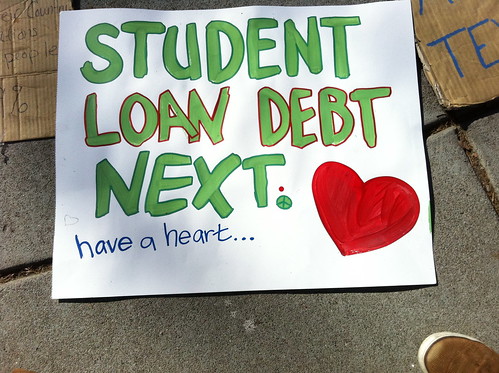I wrote a post for the blog of fellow New Jersey attorney Matthew Stoloff, who represents clients in the areas of disability rights and special education rights. That post appears on Mr. Stoloff’s blog here. You can also read the full text of my post right as follows:

In the past, I have mentioned the difficulty of getting student loans discharged in bankruptcy. But I have yet to discuss why it is so difficult to get a bankruptcy court to discharge student loans.
In this post, I’ll examine the process through a recent case from Maryland where student loans were actually discharged in a bankruptcy and discuss why that case might be anomalous.
In a nutshell, the Bankruptcy Code states that student loans are not dischargeable unless the debtor can show that repayment of the debt will cause an “undue hardship” on the debtor and his or her dependents. The famous Brunner case set the test followed in most of the country, including New Jersey, for what constitutes an “undue hardship”:
1. Whether the debtor will be unable to maintain a minimal standard of living, based on current income and expenses, if forced to repay the student loans;
2. Whether additional circumstances exist indicating that this state of affairs is likely to persist for a significant part of the repayment period for the student loans; and
3. Whether the debtor has made a good faith effort to repay the student loans.
Pa. Higher Educ. Assistance Agency v. Faish (In re Faish), 72 F.3d 298, 304-305 (3d Cir. 1995) (quoting In re Brunner, 831 F.2d at 396 (2nd Cir. 1987)).
In case you are thinking to yourself, “It’s an undue hardship for me to pay my student loans,” pause to consider the bankruptcy case, In re Brightful. There, Ms. Brightful filed for bankruptcy, asking the court to discharge her student loans. The bankruptcy court found that she had “glaring psychiatric problems” and was “emotionally unstable” to the point that she had attempted suicide twice. The court said she could not maintain a “minimal” standard of living and still pay her student loans.
But this was not enough – the court found that, under the Brunner case, Ms. Brightful must prove “a total incapacity…in the future to pay [her] debts for reasons not within [her] control.” So, the current inability to pay student loans is notthe standard. Instead, a discharge of student loans must be based on “the certainty of hopelessness… [emphasis added].”
Recently, a Maryland court considered whether a person on the autism spectrum could get her student loans discharged. See In re Todd. The debtor, Carol Todd, has a form of autism calledAsperger’s Syndrome, in addition to post-traumatic stress disorder (PTSD) and osteoporosis. Ms. Todd had a total of about $340,000 in student loan debt and sought to get these loans discharged.
Right away, we know this case is different because the judge quotes the Webster’s dictionary definitions of “undue” and “hardship,” adding that these terms do not suggest a standard that “no debtor can ever meet.” The court went on to describe how Ms. Todd was unable to function normally due to her diagnoses of Asperger’s, PTSD, and osteoporosis – but the court focused primarily on Asperger’s.
Despite her inability to function normally, Ms. Todd obtained 5 different higher education degrees and attended 5 different colleges, plus one online college. The court, however, was influenced by Ms. Todd’s belief that she did not earn her degrees, but that they were “negotiated” for her by the Department of Education, which she said helped her to obtain accommodations. In fact, the court questioned the academic rigor of the programs that she attended.
Following graduation, Ms. Todd worked as an adjunct professor teaching classes for several years, but she was not employed after that time.
In its analysis, the court determined that Ms. Todd’s situation met the “certainty of hopelessness” test due primarily to her autism/Asperger’s. Persuading the court was a doctor’s testimony showing that Ms. Todd could be a successful student, even be able to earn a Ph.D., but that she could not be a “productive” employee in the working world as we know it. In the court’s own words:
… Autism – or Asperger’s – is a permanent condition that will not permit [Ms. Todd] to function “normally” in almost any sense of the word. Because of Autism Ms. Todd has not been able, for the vast majority of her life, to gain or hold a job, let alone fashion a career, and there is no chance that state of affairs will ever change.
Reading the opinion I got the feeling that if only some basic supports were available to disabled, working adults, Carol Todd might have lost her student loan discharge case. But the court was convinced of Ms. Todd’s inability to successfully hold employment, mainly because of her autism, which, ironically, is the same condition that gave her the ability to focus on topics of interest for long enough to help her earn 5 college degrees.
Most bankruptcy student loan discharge cases are like the first case, In re Brightful – the courts apply a harsh standard to the most difficult of circumstances, usually determining that the student loans in question are not dischargeable.
But Carol Todd’s case is an outlier because the judge was willing to focus on the long-term disabling aspects of autism/Asperger’s while at the same time discounting the debtor’s obvious abilities (a metaphor for how our working world as a whole often treats disabled adults).
Will other bankruptcy courts follow the judge’s lead in In re Todd? Is it possible that in the future more people with disabilities who are unable to successfully hold employment will be able to get their student loans discharged more easily? Only time will tell.
Image by PublicDomainPictures.
 Most, but not all, debts are written off, or “discharged,” in a bankruptcy case. Is there a simple way to know what will and what will not be discharged in a Chapter 7 bankruptcy?
Most, but not all, debts are written off, or “discharged,” in a bankruptcy case. Is there a simple way to know what will and what will not be discharged in a Chapter 7 bankruptcy?


 loan payments.
loan payments.